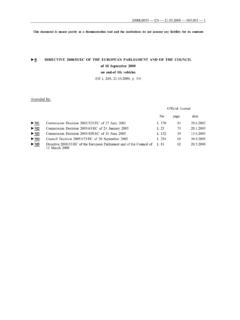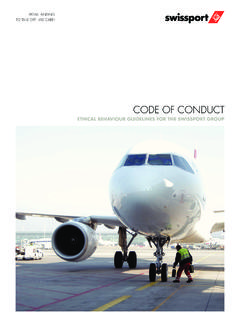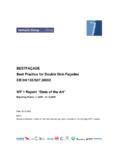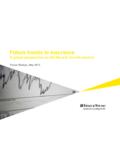Transcription of A4E’S P SINGLE TILL - Airlines for Europe
1 POSITION PAPER BRUSSELS, MARCH 2017 A4E S POSITION ON SINGLE till SUMMARY This paper sets out A4E s position on the issue of SINGLE till . A4E seeks to achieve reasonable airport charges as the basis for EU aviation competitiveness. In order to do so, airports in the EU must be effectively regulated, passengers must receive the full benefit of the non-aeronautical revenues which they generate at airports, and charges must be cost-related, efficient and non-discriminatory. A4E calls for reform of the EU Airport Charges directive 2009/12/EC (ACD) and for a more effective regulation of monopoly airports.
2 SINGLE till is the only way to effectively regulate airport charges. Economic regulation should indeed mimic normal market behaviour, and SINGLE till is the best mechanism to produce charges that are close to the competitive outcome. The ACD should therefore be reformed in order to guarantee that airports that fall under its scope apply SINGLE till . A4E believes that in its current state, the ACD is inadequate and ineffective as it only deals with the procedural aspects for setting airport charges and does not protect Airlines and their passengers from airports abusing their market power.
3 Indeed, the ACD does not provide for any economic regulation that replicates the effects of competition, and it has failed to provide a framework to prevent excessive charging and excess profitability. Airlines for Europe (A4E) is Europe s new and largest airline association, based in Brussels. Launched in January 2016, the association consists of Aegean, airBaltic, Air France KLM, Cargolux, easyJet, Finnair, Icelandair, International Airlines Group (IAG), , Lufthansa Group, Norwegian, Ryanair, TAP Portugal and Volotea, and plans to grow further.
4 With more than 550 million passengers on board each year, A4E members account for more than 70 per cent of the continent s journeys, operating more than 2,700 airplanes and generating more than EUR 100 billion in annual turnover. POSITION PAPER SINGLE till Page 2 of 3 INTRODUCTION In its current state, the EU Airports Charges directive 2009/12/EC (ACD) is inadequate and ineffective in protecting airport users and consumers from abuses of market power by airports. Whilst the purpose of economic regulation is to replicate the outcomes achieved in a competitive market, the ACD has failed to ensure that Member States establish an adequate framework to achieve this.
5 A4E believes that strong, robust, independent and effective economic regulation on the basis of a SINGLE till principle is needed where airports enjoy significant market power and abuse it by arbitrarily applying a dual till principle. In the absence of competition, regulation is required to produce an outcome that is close to what would happen in a competitive environment, thereby preventing excess profits and promoting economically efficient outcomes in terms of operations and investments. This would ensure that charges are based on efficient costs and investments that deliver the services that passengers and Airlines require, and are willing to pay for.
6 THE SINGLE till PRINCIPLE The SINGLE till principle requires profits from an airport s non-aeronautical activities ( passenger induced revenues from car parking, restaurants, etc.) to be deducted from the airport s revenue requirement for aeronautical services before determining the level of airport charges. This is how competitive markets price and operate, as recognised by the EU s State Aid SINGLE till is supported by regulators across Europe , such as the former UK Competition Commission and the Irish Commission for Aviation Regulation,2 as well as by national authorities such as the French Cour des comptes3 and the Swiss Surveillant des The SINGLE till approach contrasts with the dual till principle in which only aeronautical activities are taken into account when setting airport charges.
7 The ACD leaves it open to Member States to determine if and to what extent revenues form an airport s commercial activities may be taken into account in establishing airport charges . In doing so, the ACD fails to recognise the link between passenger volumes and commercial revenues, that SINGLE till applies in competitive markets, and, that by allowing dual till , monopoly airports are able to retain commercial revenues and increase airport charges in a way that would not be possible if competition existed. The dual till principle indeed incentivizes airports with significant market power to artificially increase aeronautical costs by allocating a disproportionate amount of assets and costs to the aeronautical till .
8 In a competitive environment, if Airlines deliver traffic growth to an airport, the airport benefits from increased non-aeronautical revenues that are passenger induced, and the airport users benefit through lower airport charges as a result of the non-aeronautical revenues being offset against those charges. Inversely, when airports do not operate in a competitive environment, a dual till approach leads to excessive and 1 European Commission, Guidelines on State aid to airport and Airlines , 2014 /C 99/03, paragraph 64 2 Commission for Aviation Regulation, Submission to the Public Consultation on the Review of Airport Charges in Ireland, 16 September 2016.
9 See also, Indecon, Report on the Review of the Regulatory Regime for Airport Charges in Ireland, 11 March 2016 3 Cour des comptes, L Etat et la comp titivit du transport a rien, Communication la commission des finances du S nat, Septembre 2016 4 Surveillant des prix, Recommandations au Conseil f d ral concernant la r vision de l Ordonnance sur les redevances des a roports, 24 February 2016 POSITION PAPER SINGLE till Page 3 of 3 unjustified profits through unreasonably high airport charges. A revised ACD should require that the SINGLE till principle must be applied.
10 THE LINK BETWEEN AERONAUTICAL AND COMMERCIAL ACTIVITIES The SINGLE till principle best reflects the indivisible link between an airport s aeronautical and commercial activities and the interdependency between the passengers that Airlines transport to airports and the non-aeronautical revenues that they themselves generate there. Indeed, under SINGLE till , the maximum permitted level of charges for aeronautical activities is set so as to allow the airports to earn a reasonable return on all assets, after taking into account the expected level of revenues from non-aeronautical services.







